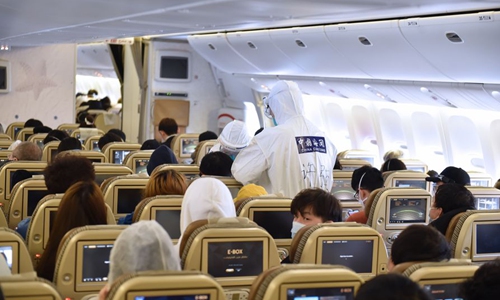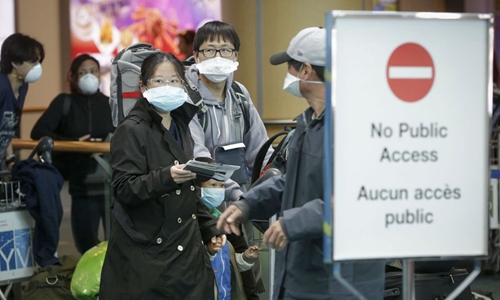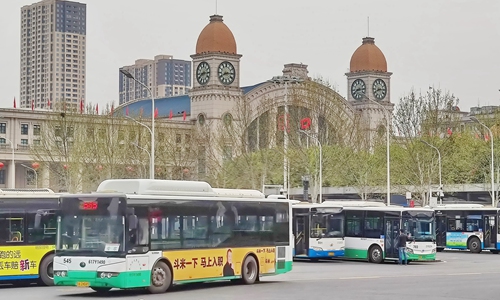Loopholes may lead to China’s 2nd wave of viral outbreaks

Customs officers inspect an inbound flight at the Capital International Airport in Beijing, capital of China, March 18, 2020. (Xinhua/Chen Zhonghao)
Loopholes in screening processes at customs and inadequate quarantine measures upon entry into Chinese cities as well as a high proportion of asymptomatic cases are making a second wave of novel coronavirus outbreak highly likely, even inevitable, as the global pandemic continues to worsen. After a new local transmitted case in southern China was reported - the first of its kind exposing loopholes in prevention work in some Chinese cities, the central government's leading work department came up with a new strategy on Monday for preventing imported cases as well as a possible rebound, in spite of domestic transmission being tamed.
Although a drop in new cases is reported on a daily basis, all new cases now are imported infections, sparking serious concerns over a looming second outbreak in China.
Renowned Chinese epidemiologist Li Lanjuan told reporters on Monday that China still faces a severe situation currently due to the surge in imported cases from other countries and regions.
Central China's Hubei Province, where the first confirmed coronavirus case was reported in the country, has been reporting no new cases since Wednesday, marking significant progress in combating the disease in the country.
All the new coronavirus cases have been imported infections since Wednesday, and China has so far reported 353 imported infections from countries like the UK, Spain and Iran.
Growing risks
"China is already facing the risk of a second outbreak as the number of imported cases already reached a small peak," Zeng Guang, chief epidemiologist of the Chinese Center for Disease Control and Prevention (CDC), told the Global Times on Monday.
Luckily for now, China only reported one case of domestic secondary transmission from imported cases, so the situation is still under control, Zeng noted.
Health authorities in South China's Guangdong Province on Sunday reported one patient who contracted the virus from an imported case. Some Chinese medical experts warned that a domestic case infected by an imported case reflects loopholes in local prevention measures and a failure to cut off these transmission channels.
According to contact tracing, this patient in Guangdong had been in close contact with a woman who had returned from Turkey on March 9. On arrival, she had passed temperature checks at the airport and was allowed to return home via a car.

Travellers wearing face masks are seen at Vancouver International Airport in Richmond, Canada, March 16, 2020. (Photo by Liang Sen/Xinhua)
Relevant government departments should spare no efforts to round up those imported cases, and to test all international travelers, in order to prevent secondary transmission of these cases, warned Zeng.
As many imported infections are asymptomatic, with the onset of symptoms mimicking the common cold, this suggested other countries are not paying deserved attention to the pandemic, China's top COVID-19 expert Zhong Nanshan said in a conference earlier this month.
Some overseas experts also warned that covert coronavirus infections could lead to new outbreaks, while scientists are now rushing to estimate the proportion of people with mild or no symptoms who could be spreading the pathogen, according to an article published by Nature on Friday. Also some estimated those covert cases could represent some 60 percent of all infections.
A second wave outbreak in China is probably inevitable until we have a vaccine or effective treatments or prophylaxis, Larry William Chang, an infectious diseases expert at Johns Hopkins School of Medicine, told the Global Times over the weekend.
"But with intensive testing, contact tracing, and isolation, I think the extent of the wave can be managed," he said.
The Chinese central government's leading work department for steering COVID-19 prevention, chaired by Premier Li Keqiang, urged to deploy prevention policies which are now targeting prevention both relapses of domestic cases and increases of imported cases, according to its meeting on Monday.
Ramping up efforts
However, various Chinese medical experts, including Zeng from China's CDC, believed that a second outbreak is unlikely, considering the country's stringent measures and experiences during the past two months in combating the disease.
Wu Zunyou, an expert on epidemiology at the Chinese Center for Disease Control and Prevention, told China Central Television on Saturday that China has set up three "stages" to crack down on imported infections.
The first stage includes temperature and symptom checks at border entrances, along with examination of travel history in the past 14 days. "This could filter out about one-third of the infections," said Wu. A 14-day quarantine after arrival marks the second stage; and the third stage is inspections from medical organizations on quarantined patients.
Amid mounting pressure in containing imported cases, China's General Administration of Customs said on Monday foreign nationals who conceal information and furnish false information to border officials when entering China will be denied entry as punishment. Meanwhile, customs is closely monitoring vehicles coming from key pandemic countries and regions, and travelers must undergo health examinations at designated places.

A line 545 bus departs from its first stop, Hankou Railway Station, in Central China's Hubei Province on Monday. The local bus operator is running partial services on a trial basis after suspension due to the coronavirus outbreak. Residents need to register with their ID and health QR code to take a bus, and the buses will take regular disinfection measures. Photo: cnsphotos
Some patients returning from abroad have gone to supermarkets or had dinner with others, raising risks of close human-to-human transmission, Pang Xinghuo, vice director of the Beijing CDC, said during a press conference on Monday.
Observers warned that the most ideal situation was that the country would completely shut its doors to the outside world in preventing imported infections, but China cannnot afford to realize this. "It's inevitable to have imported cases," Liu Yuanju, a research fellow at the Shanghai Institute of Finance and Law, told the Global Times on Monday, "If we enter an absolute lockdown, how do we deal with our export and economic ties?".
Cities in China are now taking aggressive measures tracking case by case, which mainly focuses on isolating confirmed and suspected patients while treating them in a timely manner and tracking down close contacts by all possible means.
Yang Zhanqiu, a virologist from Wuhan University, told the Global Times that if imported infections are not handled properly, or if certain cities adopted lax regulations on international travelers' entry, these factors combined may give rise to localized infections in some cities.
Centralized quarantine is the most effective way to treat all arrivals from overseas, which could eliminate any possible risks, while self-quarantine at home may pose some problems, as some arrivals may have negative results in nucleic acid tests but then transmit the pathogen to others upon returning home, he said.
"So far, Beijing has adopted the most strict centralized quarantine measures and travelers pay for expenses themselves, which could be copied by other cities," Yang noted.